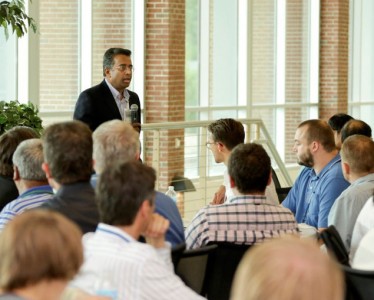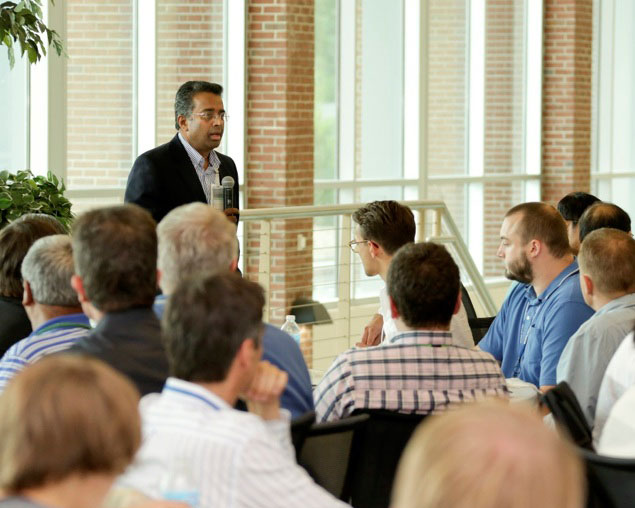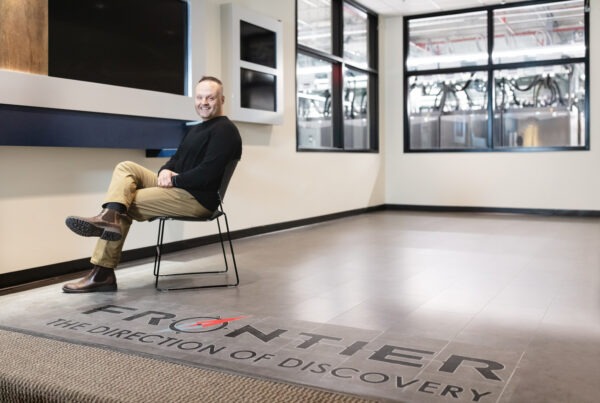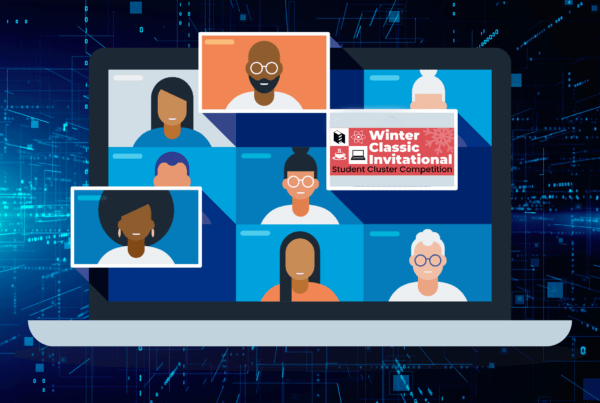
Ramesh Ramamoorthy, ORNL Deputy Director for Science and Technology, addresses OLCF Users during a dinner talk at this year’s Annual Users Meeting on July 23. The title of
his presentation was “Science Drivers for Exascale Computing.”
Training, skills prep on first day followed by research-oriented agenda at event
One hundred four Titan users gathered at the Oak Ridge campus last month for the annual Oak Ridge Leadership Computing Facility (OLCF) user meeting.
Judy Hill, a computational scientist for OLCF, who was on the planning committee for the user meeting, said that its success was in part due to differences in the focus on this user meeting from those in the past.
“In the past we’ve done a user meeting that was very training oriented—how to get on the system, basic debugging, how to compile your code—that sort of thing. This year we really wanted to attract the actual PIs [principal investigators] and the software developers, especially since we’re preparing for software readiness for OLCF 4.”
While users could still receive training and skills preparation on that first day, the rest of the event was much more research oriented. Hill said the basic format involved a keynote speaker in the morning followed by an afternoon session that focused on the scientific progress users had made on Titan. A total of 26 PIs attended this year’s meeting.
“We had a science PI paired with a software developer. So the PI set the stage for the overall science and the code developer talked about the overall challenges that they had to overcome.”
On Day 1, the keynote talk was given by Jeremy Smith, of the University of Tennessee and ORNL. He spoke on “Supercomputing for energy, the environment and health.” The Day 2 keynote, “Accelerating Science Impact through Big Data Workflow Management and Leadership Computing,” was delivered by Alexi Klimentov of Brookhaven National Laboratory. David Dixon, of the University of Alabama, gave the Day 3 keynote.
One of the fundamental goals of this event was showing the work that users had done using OLCF resources. Hill emphasized that it wasn’t just about the immediate successes but also the challenges people have faced on Titan and how they overcame them. This sharing of experiences was intended to help inform both users and staff to improve in the future.
“In the past the user meeting has been a push of information. We’ve stood at the front and pushed info to users, and they’ve tried to absorb the vast fire-hose of information [pointed in] their direction, and I think that’s a good thing,” Hill explained. “But what’s been missing is the flow of info back to the OLCF.”
The OLCF has always administered surveys and other such methods of listening to users’ comments—both positive and negative. However, Hill believes that in-person conversations about their work are much more effective and will bolster the OLCF’s communication to the program office as well as the broader community about the good things that are happening here.
“When we can sit down and have that conversation with the person who’s having that challenge, we can better understand that challenge, perhaps make policy changes or institute new services that might meet those needs. We can address those challenges in a proactive way rather than in a reactive way.”
With regard to next year, Hill said that planning has already started and the OLCF will announce the 2015 date soon.
“This was a much bigger success than we thought—a wild success. So now I think the challenge is to meet the expectation that we set and exceed it for next year—try and build on what we’ve got.” —Christie Thiessen






